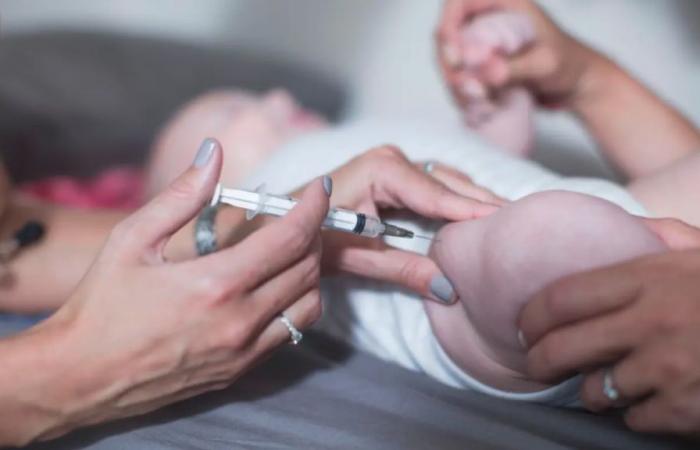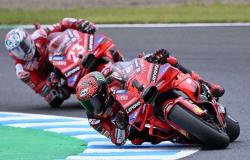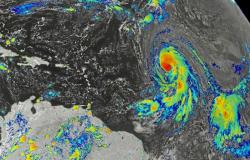There is a new substance active against respiratory infections caused by respiratory syncytial virus (RSV), which must be injected into infants immediately after birth. This “vaccine” reduces the likelihood of serious illness by 80%. But will Switzerland receive this active substance in time?
Bruno Knellwolf / ch media
The dreaded RSV season will soon begin. A first infant has already been hospitalized at the pediatric hospital in Eastern Switzerland after being infected with respiratory syncytial virus. Swiss pediatric hospitals have not been the only ones to be filled with little RSV patients over the past two winters: waves of infection have traveled around the world:
“RSV is the most common cause of infant hospitalization during the winter months. Last December, there were periods when all the babies hospitalized were because of RSV.
Anita Niederer-Loher, infectious disease specialist at the pediatric hospital of Eastern Switzerland.
During the Covid-19 pandemic, this virus has barely been talked about. Covid hygiene measures helped prevent infection of children. Indeed, respiratory syncytial virus is usually spread by droplets and aerosols by adults and older children, in whom symptoms are usually no more serious than a cold.
But the situation is different in newborns: infected infants have difficulty breathing and can no longer drink properly. In addition to fever and ear infections, inflammation and accumulation of mucus in the lower respiratory tract, and even pneumonia, are most often observed in children under the age of two.
The younger the baby, the greater the danger
This is why infected babies are given oxygen in the hospital and, depending on the severity of the illness, a stomach tube to hydrate themselves. Some infants also become more seriously ill and require intensive care. The younger the baby, the higher the risk of serious illness after RSV infection. All babies are at risk, even healthy ones.
But the active substance nirsevimab, sold under the name Beyfortus, now gives parents hope. This monoclonal antibody is injected shortly after birth, during the first week of life.
“Beyfortus reduces the likelihood of RSV infection by approximately 80%”
Anita Niederer-Loher
Deborah Wallrabenstein from Basel Children’s Hospital confirms this: “The active substance is very effective and has an excellent safety profile.”
The Federal Commission for Vaccinations (Ekif) and the Federal Office of Public Health (FOPH) recommended this substance “because infants very often contract RSV infection during their first winter. And because there is a high risk of hospitalization, especially in the first months of life,” explains Christoph Berger from the Zurich Children’s Hospital.
Before Beyfortus, there was already a similar active substance called Synagis. But this does not act for long and must therefore be injected five to six times during an RSV season. In addition, each of these doses costs more than 1000 francs. This is why this medicine was only used for infants who were particularly at risk. Beyfortus, on the other hand, only needs to be injected once per season.
For the first time, babies as young as a few days old were given a Beyfortus injection in hospital. Infants born during RSV season receive a dose of Beyfortus shortly after birth because the risk of serious infection is high. For babies born between April and September, the active substance is only injected at the start of the RSV season, which lasts from October to March.
Switzerland does not yet have access to the Beyfortus
The EU authorized the marketing of Beyfortus in November 2022, but it took another year for Switzerland to do the same. Protection against RSV for babies is therefore not yet available from us. It is, however, clear that health insurance funds will cover the costs of this “RSV vaccination”. The price is also known: the single dose costs 396 francs. Pediatricians hope that the doses ordered from the company Sanofi will arrive in Switzerland from mid-October.
“The demand for Beyfortus has been very high, both in Spain and France,” explains Niederer. In these countries, up to 90% of infants have been immunized. This shows that parental acceptance was very high, although France is in general a rather skeptical country when it comes to vaccination. In Switzerland, the infectious disease specialist expects the parents’ acceptance rate to be approximately the same. However, she fears that it will not be possible to deliver enough doses and that there is a shortage of the active substance in Switzerland as well.
There is already a shortage in Germany, where Beyfortus has been recommended since June. The pharmaceutical company explains that the shortage will last at least until October 11. A spokesperson for the German professional association of doctors for children and adolescents believes that this is a big blow for timely immunization for the next cold season.
“It is not a vaccine, but a medicine”
In the meantime, infectious disease specialist Niederer-Loher is irritated by the fact that people are talking about “RSV vaccination” everywhere:
“It is not a vaccine, but an antibody, a medicine that we inject”
This makes a difference: a vaccination provokes a defense reaction in our immune system. With a viral component in the vaccine, our body is prompted to produce antibodies which, if threatened, can fight the virus.
Beyfortus, on the other hand, contains ready-made antibodies. These monoclonal antibodies protect infants immediately after the injection. Indeed, in the event of infection, antibodies directly neutralize viruses. Unlike an active vaccination, or even an infection, the immune system does not first have to produce antibodies itself. The baby is therefore protected immediately and not after a few days as is the case with a vaccination.
Because it is a medicine and not a vaccine, it does not have the symptomatic side effects of vaccination, such as fever. Beyfortus is therefore very well tolerated. However, there may be redness or swelling at the site of the sting.
There is also an active RSV vaccine called Abrysbo. The vaccine made by Pfizer, however, is only authorized for the elderly and, in some countries, for pregnant women, but not for children. As the risk of more serious illness from RSV increases again among seniors, the Abrysbo vaccine is primarily aimed at older people. But it can also indirectly help young children.
Vaccination of pregnant women
“The idea of vaccinating pregnant women is the same as vaccinating whooping cough or the flu. After vaccination, the mother produces antibodies and transmits them to the child via the placenta. During the first months of his life, he is therefore protected against serious infection. However, there is not yet a recommendation from Ekif for the vaccination of pregnant women with Abrysbo this winter, nor is it covered by health insurance funds.
Moderna’s mRESVIA mRNA vaccine, also intended to protect the elderly against RSV infections, has just been authorized by the European Medicines Agency (Ema). In Switzerland, Swissmedic is currently examining the authorization application; there is therefore no recommendation yet.
Translated and adapted from German by Léa Krejci






